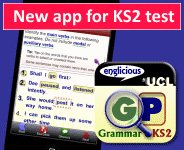Topic: 'A' level
Relevant for England and Wales National Curriculum at 'A' level (Key Stage 5).
Englicious contains many resources for English language in schools, but the vast majority of them require you to register and log in first. For more information, see What is Englicious?


